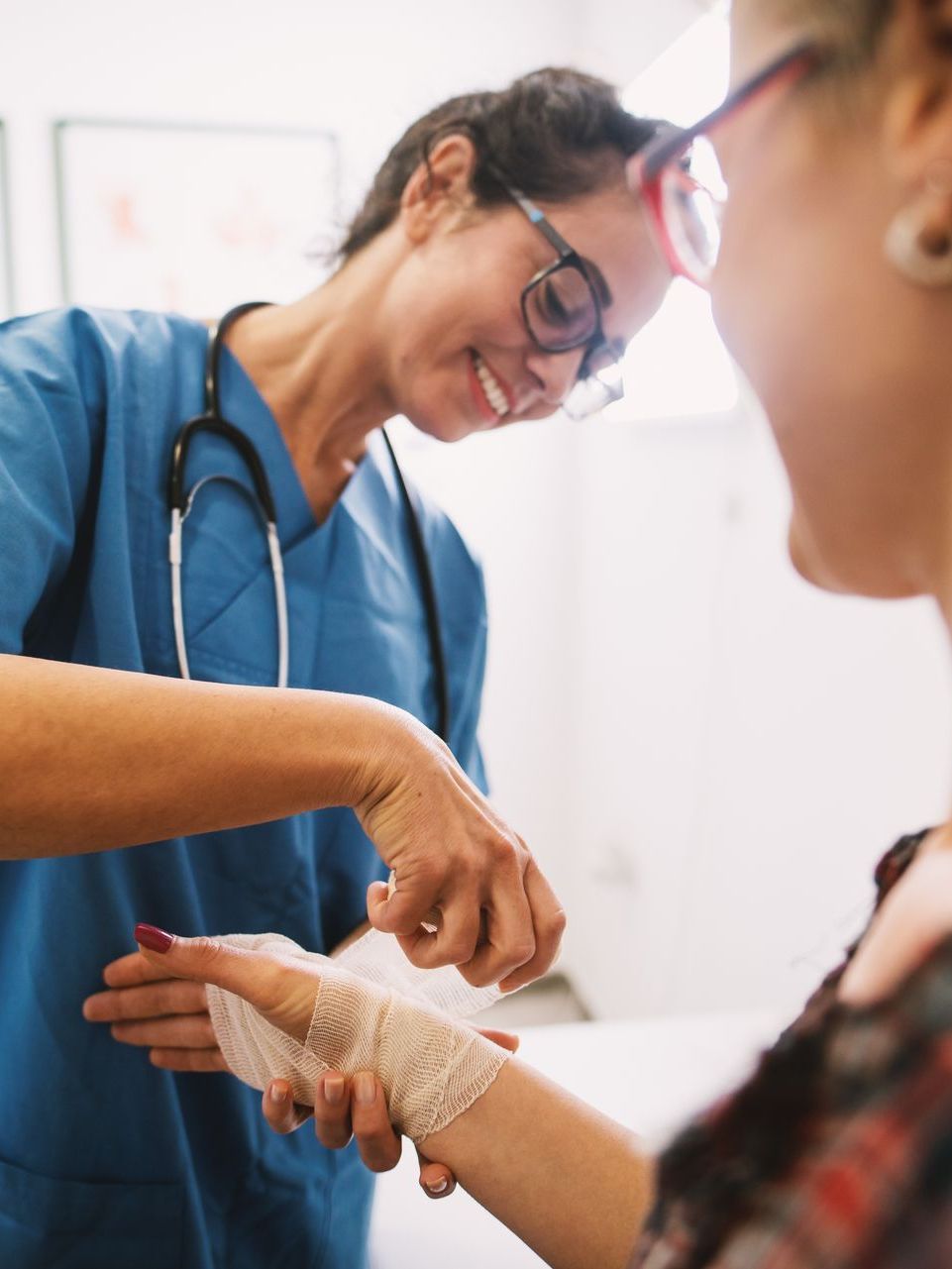Minor Cuts and Wounds
Healthcare Services
Treatment for Cuts and Wound Care in Houston
Minor cuts and wounds can become a major issue without proper care and attention. While you typically won’t need medical attention for minor cuts and abrasions, any large cuts may require stitches for proper healing and to minimize scarring. You may not know for sure when you should go to a doctor or not, which is why it’s often best to visit if you have any concerns or misgivings about the severity of the wound.
Types of Minor Cuts and Wounds
Abrasions: Abrasions are superficial yet painful injuries where the top layer of skin (epidermis) is scraped off, often due to friction against a rough surface, like falling on pavement. Though usually not deep, abrasions can be prone to infection if not cleaned properly.
Lacerations: Lacerations are deep, sometimes jagged cuts or tears in the skin caused by sharp objects like knives or broken glass. While minor lacerations can be treated at home, deeper ones may require medical attention to prevent infection and ensure the wound heals properly – especially if stitches are required.
Puncture Wounds: Puncture wounds occur when a pointed object, like a nail or needle, pierces the skin. Puncture wounds are typically narrow and deep, making them highly susceptible to infections, especially tetanus. It's crucial to clean these wounds thoroughly, which is why many opt to see a medical professional to ensure it’s properly sanitized.
Blisters: Although not cuts, blisters are shallow skin wounds caused by friction or burns that form a bubble filled with fluid between the skin. Because blisters can become infected, especially if they burst, you should keep them clean and covered.
Avulsions: Avulsions occur when a chunk of skin, tissue or a limb in extreme cases is forcibly torn away from the body, often in accidents involving machinery or severe trauma. While minor avulsions can sometimes be treated at home, larger ones require immediate medical attention.
Who Is Most at Risk of Developing a Minor Cut or Wound?
Due to their fragile skin, young children and older adults are often the most susceptible to these types of injuries. However, if you have a condition like diabetes that impairs your blood circulation or are taking medication that has similar effects, such as a blood thinner, you may have elevated your risk for cuts, deeper wounds or clotting problems.
Emergency Wound Care
If you sustain a minor cut or wound, your first step should be to stop the bleeding. Wash your hands to minimize your risk of infection and apply direct pressure to the wound using a clean cloth or bandage. You can help reduce your blood flow by elevating the wound above your heart, if possible. If the bleeding is severe or doesn’t stop after 15 minutes, you should go to a hospital or clinic promptly.
If the blood flow has stopped, gently rinse the wound under running water for several minutes to remove dirt and debris. Use mild soap to clean the area. Then apply an antiseptic solution, like hydrogen peroxide, around the wound to reduce your risk of infection. You may also want to use an antiseptic ointment to keep the area moist, which can promote faster healing and limit scarring. Don’t use a strong solution, and never apply it directly on the wound, as it could potentially damage the tissue.
Finally, cover the wound with a sterile bandage or gauze pad to prevent dirt and bacteria from seeping into the open wound. Clean the wound and replace the dressing at least once a day, as a wet or dirty bandage could increase your risk of infection. If you notice any signs of infection, such as redness, swelling, increased pain or if it emits a foul odor, consult with your doctor immediately.
When to Seek Medical Attention
Even if the wound isn’t infected, you may need to see a healthcare professional if:
- The wound has jagged edges or is more than 1/4 inches deep and needs stitches.
- If the bleeding doesn’t stop
- There’s an object stuck in the wound (never try to get it out yourself!)
- The wound was caused by a dirty or rusty object and you need a tetanus booster shot
- If the wound is on your face or joints and requires special care
How Can You Prevent Sustaining a Cut or Wound
Heeding safety warnings, following instructions on products, using proper protective gear and avoiding unnecessary risks are often the best ways to avoid wounds during activities where they are likely to occur.
Even people who take the utmost caution can still suffer lacerations, bruises, puncture wounds or abrasions due to unavoidable accidents or mishaps. Keep a first aid kit stocked in your home with everything you’ll need for a potential cut or wound, including sterile cloths, bandages and antiseptics. You may also want to keep a first aid kit in your car In the event of an auto accident or with your work gear or vehicle if you work in a high-risk industry like construction.
If you need stitches, wound care or help treating an infected wound in Houston, the healthcare professionals at St. Hope Healthcare will provide you with prompt and effective treatment. Visit one of our clinics, call
(713) 778-1300 or go through our online portal to schedule an appointment for non-emergency situations. If you or someone else suffers a severe injury and you need help immediately, you should call 911.




